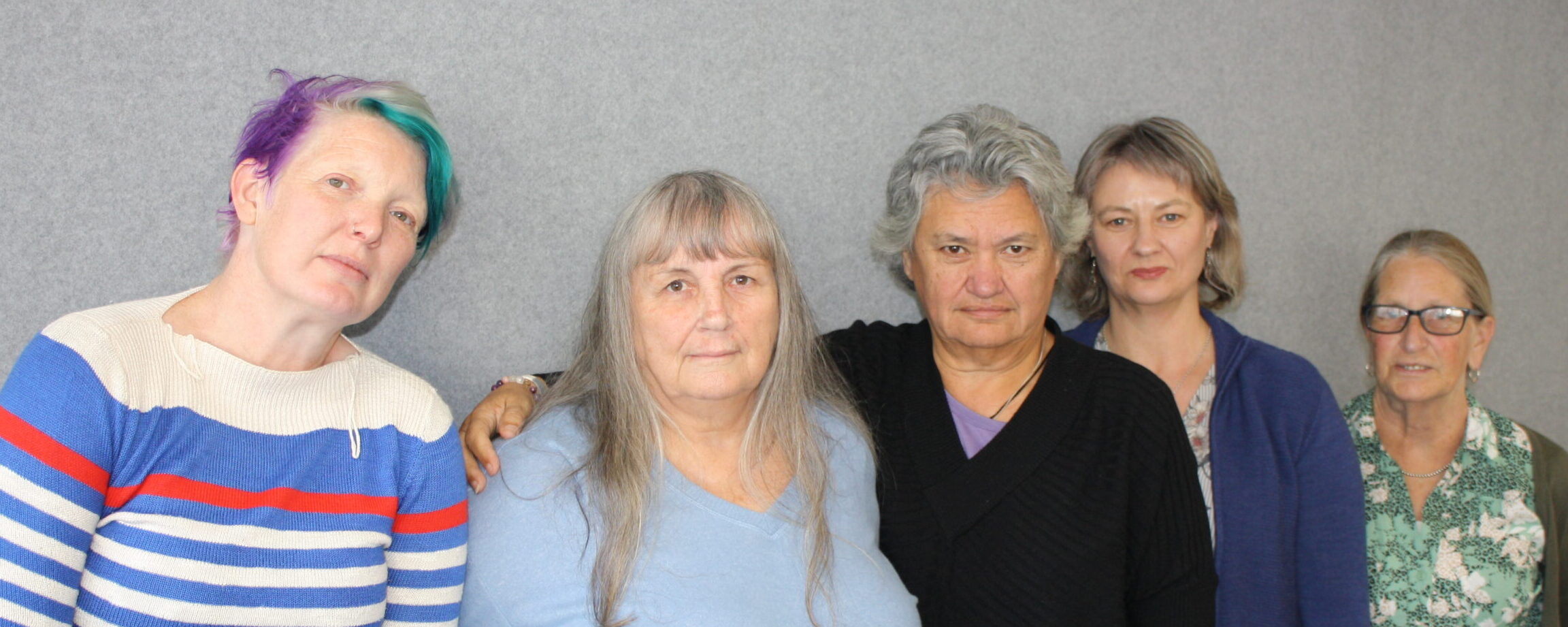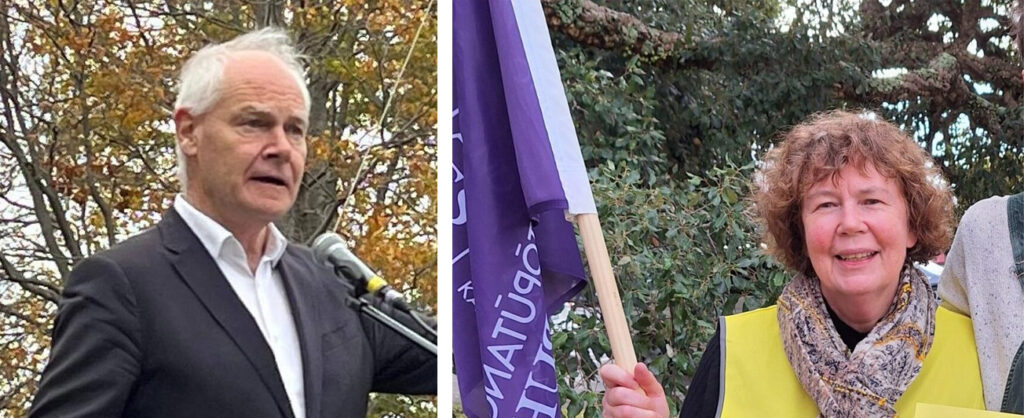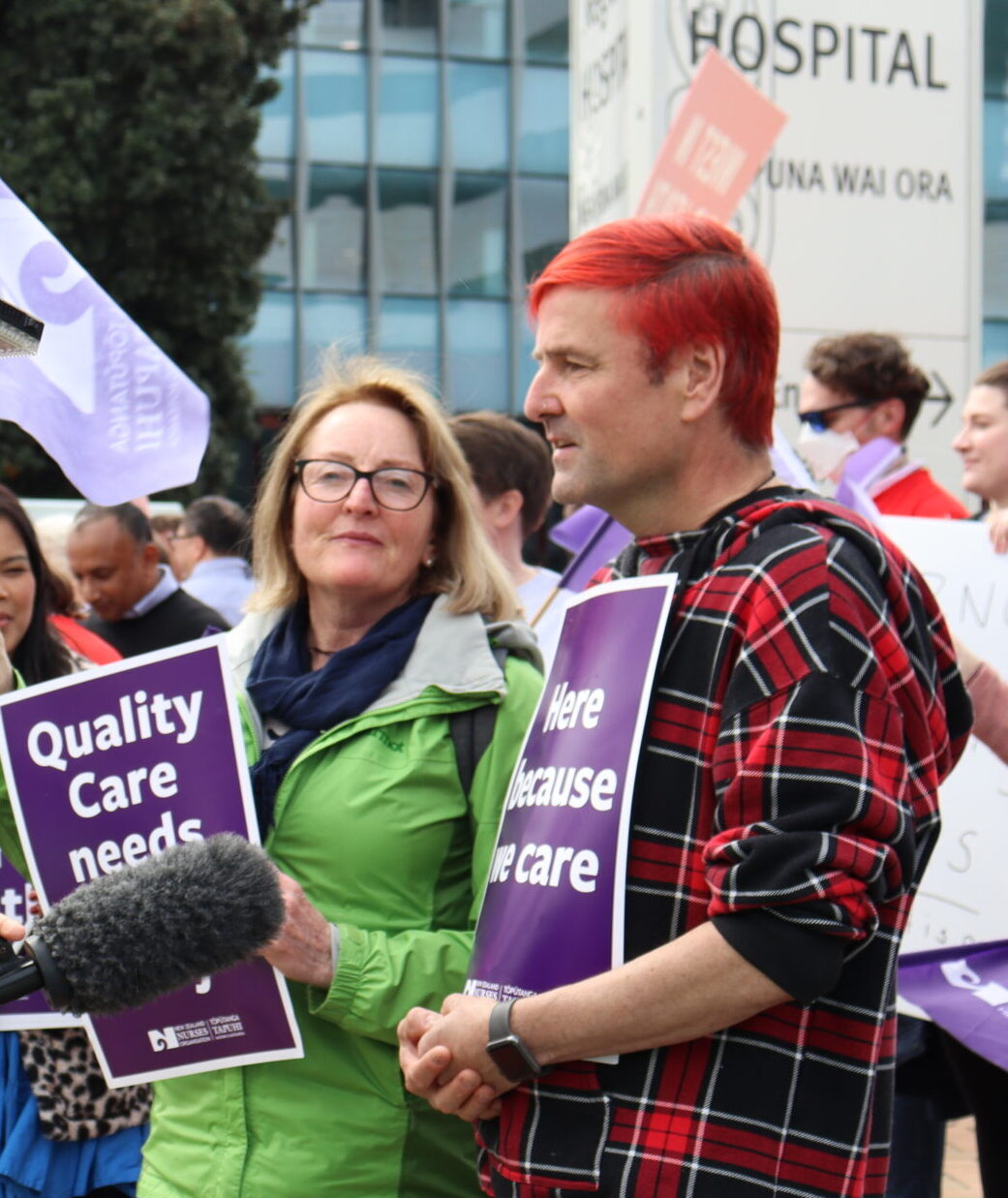‘We have consistently fallen behind in wages for well over a decade now. Is it any wonder that many of our workforce move offshore?’
The “out of the blue” meeting came after damning survey findings revealed three quarters of mental health nurses had been threatened amid rising levels of violence, aggression and short-staffing.
Mental health nurses section (MHNS) chair Helen Garrick, NZNO president Anne Daniels and chief executive Paul Goulter were invited to discuss the findings last Friday.
‘Poor pay for the work I do – shift work, working public holidays and nights.’
Garrick said she challenged Doocey over why more money was being poured into the milder end of mental health at a time when community and inpatient crisis services were “crumbling” with staff facing escalating violence.
Te Whatu Ora data released to NZNO last month revealed mental health wards are the most understaffed of all, with three wards reporting more than 1000 understaffed shifts in 2023. The Mason Clinic’s Tāne Whakapiripiri ward in Waitematā was understaffed 99.45 per cent of the time — meaning just six shifts were safely staffed that year.

The mental health nurses section wants to see:
Nurse leadership: It is important to have mental health nurses leading teams of mental health nurses. There is also a need for clear career pathways.
Education and workforce development for registered nurses: Specialist mental health nurse training allowing nurses to enter mental health directly upon graduation. More focus on talking therapies in education.
Professional/ clinical supervision and kaupapa Māori supervision: Both professional and cultural supervision, paid for by employers and supported with a register of approved supervisors.
Recruitment: Needs to be a key focus because of the ageing workforce and already-depleted ranks. Mental health undergrad programmes would aid recruitment. Māori and Pasifika recruitment should be targeted.
Retention: Much of this centres on staff desiring recognition of role/expertise and wanting to feel safe in clinical settings.
Skill mix: Advocacy for the role of the mental health & addictions (MH&A) nurse across the sector. Clarity in describing what MH&A nurses bring to each service — and care to prevent the subtle erosion of nursing roles by the unregulated support workforce.
Māori mental health and addiction nursing: Defining this role and its scope.
More nurse practitioners. Increasing the numbers of mental health NPs especially in community and primary care. More emphasis on therapeutic skills such as talking therapies.
System cracks we discussed with the 2018 mental health inquiry He Ara Oranga team have not been addressed and appear to be worsening, such as services for people with high and complex needs and acute/crisis and inpatient services. We fear this may deteriorate further with the police-stated intention to withdraw from mental health calls. There is an urgent need for a rapidly increased mental health nursing workforce to fill these roles.
— By Helen Garrick.
Mental health advocate and former comedian Mike King was controversially awarded $24 million over four years for his youth counselling charity I am Hope recently.
Meanwhile, a Waikato mental health facility has been so overcrowded, patients were forced to sleep on the floor and in interview rooms, RNZ has reported.

Garrick also urged Doocey to build up the mental health nursing workforce, both in expertise and numbers — something he seemed interested in exploring, she told Kaitiaki.
Ideas to reduce violence, like reducing overcrowding and initiatives like the UK-based ‘SafeWards‘ which uses evidence-based interventions to reduce conflict, also seemed of interest, she said.
Garrick said while the 30-minute meeting was “out of the blue”, she was happy for the opportunity and pleased to see a dedicated minister for mental health.
‘For me it is really heart-breaking watching new grads that I have mentored, supported and supervised losing their passion and becoming tired, fearful and burnt out in a very short time.’
Doocey told Kaitiaki he was keen to have further discussions about the pressures on nurses, including their safety, and after the meeting had asked officials to follow up their ideas with NZNO “to understand them further”.
“Working in the mental health field can be a challenging and confronting area of nursing, however our people have a right to a workplace in which they feel safe and able to carry out their duties.”
Doocey said he was working closely with Health New Zealand (HNZ) to develop a specific mental health and addiction workforce plan, with details to come “in due course”.
This year, HNZ had funded a record 303 new entry to specialist practice (NESP) places for nurses entering mental health and addictions and 87 places for allied workers in occupational therapy and social work.
An international recruitment campaign launched earlier this year had also drawn high interest, he said.
Mental health nurses hospitalised
The MHNS survey found an alarming 76 per cent of mental health nurses had been threatened and 40 per cent assaulted over the preceding year. One incident was so serious, it put seven staff in ED, one nurse said.
‘I often feel unsafe at work and I would not encourage anyone to work on an acute admission ward.’
More than 100, or 24 per cent, of NZNO’s 432 mental health nurses responded to the 2023 survey.
Staffing shortages, particularly in experienced nurses, was one of the biggest challenges, causing “overwhelmingly” high workloads, overcrowding and “concerning” levels of burnout, the survey found.
Escalating aggression, understaffing and burnout were all directly related, Garrick told Kaitiaki.

“We have people who require three staff to work with them because of the complexity of their needs and the potential for behaviour that’s unsafe for staff. So if you have three staff and one person – who does all the rest of the work? It’s just maths.”
Methamphetamine ‘psychosis’
Wellington mental health nurse Grant Brookes — also an NZNO board member — said much of the violence was due to methamphetamine-related psychosis.

Tangata whairoa with addiction issues were being housed alongside those with different needs, creating “significant safety risks” and challenges for carers, he said.
“We care about doing a good job for tangata whaiora, but feel we cannot do that in the current conditions.”
Nurses surveyed also said they did not feel they were paid enough for the “personal cost” of the role and shift work across holidays and nights, nor supported with enough supervision or professional development.
‘New nurses are overwhelmed, afraid and feel they have no voice to complain. It is extremely sad to see them leave especially from acute wards and often nursing, feeling ‘burnt out’.’
The workplace pressures meant there was little time for professional upskilling and education — even if it was available.
‘With overcrowded wards nurses are becoming more stressed which compounds the already dire situation for unwell inpatients.’
Growing levels of violence and aggression from patients were a high risk to both staff and other patients, with a lack of security and support, nurses said.
“There is a refusal to believe the violence is as prolific as it is and the environment is incredibly stressful to work in.”
Garrick said the findings “weren’t surprising at all” given how mental health nurses’ concerns had been ignored by the previous Government in its 2018 mental health inquiry He Ara Oranga.
‘Morale is at an all-time low and this job is more dangerous than it has ever been.’
“So it wasn’t a surprise at all people are still battling with acute services, with not having enough staff,” she said. “All of the pressures are still there, because nothing was done post-inquiry because they didn’t actually look at the hard end of the mental health services, which are people who need ongoing care in mental health services like community or inpatient.”
Garrick said as well as more nurses, more acute beds and community services were needed for people with high and complex mental health needs. This would also help free up acute inpatient beds.
‘Low staff numbers, high acuity, fire fighting and unable to provide effective, sustainable treatment.’
Mental health nurses told Kaitiaki a year ago they were “beyond crisis” with record levels of methamphetamine-fuelled violence and daily assaults.
— A kōrero on Māori mental health was postponed until NZNO kaiwhakahaere Kerri Nuku was available to meet with Doocey, who was keen to continue the contact, Goulter said.





